Template:Header ProDon
Introduction
The creation of the software master documents is integrated by Microsoft Word. The merge fields are selected from the software and are automatically sent to Word to prepare the document. The master document management allows you to create, modify, activate or deactivate the master documents.
Presentation of the management screen
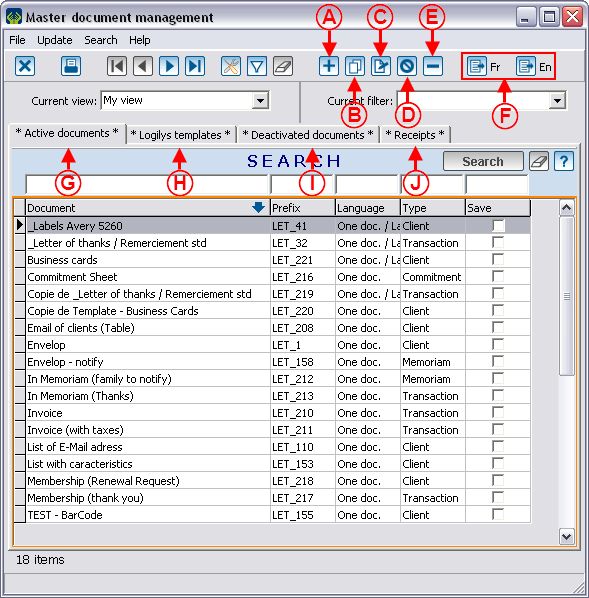
|
|
A: Allows you to create a new document.
|
B: Allows you to duplicate a document in order to use it as a template for a new document. You simply need to select the document to duplicate, then click on that button.
|
|
C: Allows you to edit a master document. You simply need to select the document to edit, then click on that button.
|
D: Allows you to activate or deactivate a document in order to place it in the "Active documents" or "Deactivated documents" tab.
|
|
E: Allows you to delete a master document. You simply need to select the document to delete, then click on that button (however, this option is not recommended; it is best to deactivate a document rather than deleting it).
|
F: Allows you to produce the document in a specific language. However, if the option "Use a document no matter what language" has been chosen for the document, there will only be one button.
|
|
G: This tab contains the active documents available for use in the software.
|
H: This tab contains the documents provided by Logilys as references. It is possible to duplicate and modify them as needed.
|
|
I: This tab contains the deactivated documents not available for use in the software.
|
J: This tab contains the master documents of "Receipts" type.
|
Configuration of a document
By clicking on the  ,
,  or
or  buttons in the "Master document management" window, the "Edit/View master document" window opens in so that you can configure the document.
buttons in the "Master document management" window, the "Edit/View master document" window opens in so that you can configure the document.
Main screen
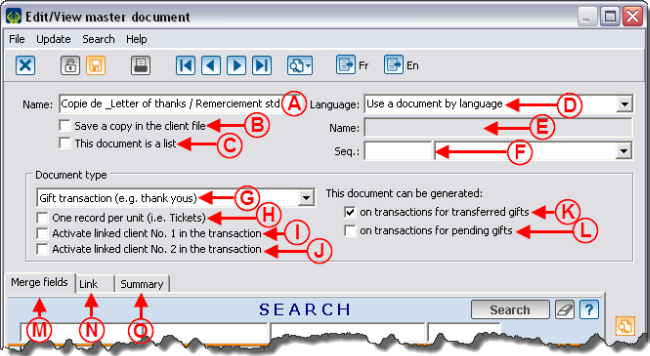
|
|
A: Allows you to name the document. This name will be used throughout the software.
|
B: If this option is activated, the document will have to be produced individually (one client at a time and not in a massive way).A material copy of the document will be saved in the client's file.Caution: the activation of this option is not use to plan follow-ups concerning a document. For reply statistics or to make a recall (2nd mailing), consult the "Mailings history" document.
|
|
C: Allows you to enter or not a section break between each element to merge.
|
D: There are two options in this drop-down list: "Use a document no matter what language", which allows you to produce a single document and "Use a document by language", which allows you to produce several documents, one for each language configured in the software (English, French ...).
|
|
E: Linked to option B, and allows you specify the material name of the document in the computer.
|
F: Activates a merge field linked to a sequential number. However, it is impossible to generate the same number twice (e.g. if it is necessary to reprint a document, it will not have its original number, it will follow the sequence instead).
|
|
G: It is the type of master document. The type has an impact on the merge fields available, as well as on the places where the master documents are available in the software. For more information, see the different types of master documents.
|
H: Allows you to produce an equal number of documents to the number of units present in a transaction.
|
|
I and J: Make available merge fields based on clients linked to transactions.
|
K and L: Indicate if the document should be produced before and/or after receiving the payment for the transactions.
|
|
M: This tab allows you to specify the merge fields that will be available during the production of the master document in Word.
|
N: This tab makes available merge fields based on a link between two clients' files.
|
|
O: This tab allows you to add summaries to a document. Click here for more details regarding summaries.
|
|
Types of documents (Complementary to step G)
THe type of document has a direct impact on the merge fields available and on the paces where they are available the different master documents. Each document type is linked to a precise type of mass mailing. For instance, the documents of "Client" type can only be used in the "Client" type mass mailing. Therefore, it is possible to use the "Client" type document where the "Client" type mass mailing is present.
Here is the list of the types of documents, the fields that will be available in Wordduring the merge, as well as the location where you can find them in the software.
|
Type of document
|
Available merge fields by type of document
|
Location of use by type of document
|
|
Client 
|
Fields of the "Client management".
|
Virtually present in all the managements of the software.
|
|
Transaction 
|
Fields of the "Transaction management" and of the "Client management".
|
Present in the "Transaction management" and in "Analysis & History".
|
|
Commitment 
|
Fields in the "Commitments" tab of "Analysis & History" and fields of the "Client management".
|
Only present in "Analysis & History" and in the "Commitments" tab.
|
|
In Memoriam gifts 
|
Information fields relative to a deceased and to the family to notify.
NOTE: The fields relative to a deceased person start with "DEC_" and the fields regarding the family to notify start with "FAM_".
|
Only present during the In memoriam gifts process.
|
|
Contact 
|
Fields of the "Client mangement".
NOTE: The fields relative to a contact start with "CON_" and the fields relative to a client start with "CLI_".
|
Present in the "Client management".
|
|
Receipts 
|
Fields of the "Batch processing: Receipts".
|
Present in the "Batch processing: Receipts" and in the transaction during the reissuing of a receipt.
|
"Merge fields" tab
This tab allows you to determine the merge fields that will be available during the production of the master document in Word.
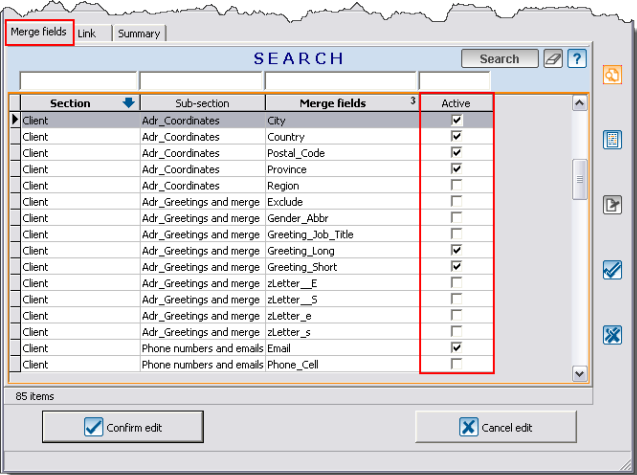
|
|
Select the wanted merge fields by double-clicking in the "check box" or by using the arrows and keyboard spacebar. The arrows are used to browse from one line to the other and the spacebar is used to check or uncheck the box.
|
"Link" tab
This tab makes available merge fields based on a link between two clients' files.
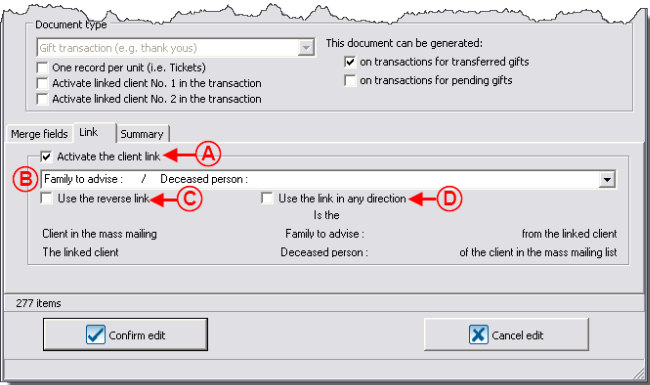
|
|
A: This box makes available a "Link" field during mass mailing. When it is checked, the options below appear.
|
B: Using the drop-down list, select the wanted link. In this example, "Family to advise" linked to the deceased will be available during the merge.
|
|
C: This box allows you to reverse the link. In this example, if the box were checked, the field would indicate the link between the "Deceased" and the "Family to advise".
|
D: This box makes both fields available. In this example, if the box had been activated, the field indicating the link between the "Family to advise" and the "Deceased"; and the field indicating the link between the "Deceased" and the "Family to advise" would be available during the merge.
|
"Summary" tab
This tab allows you to add summaries to a document. Click here for more details concerning the summaries.
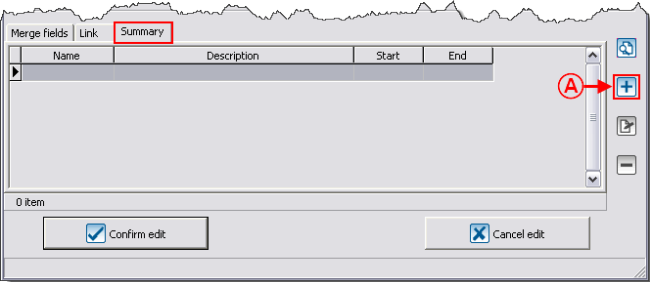
|
|
A: To add a summary to a master document, open the "Edit/View master document" window, at the bottom of the window, go in the "Summary" tab, then click on the  button. button.
|
|
|
|
B: Allows you to choose a summary previously created. To do so, select the right summary, then click on " Confirm the selection". Confirm the selection".
|
C: The "New" button allows you to create a new summary.
|
|
The chosen summary will then be found in the "Summary" tab of the "Edit/View master document" window.
|
|
|
|
D: In the master document, the merge field will have the name indicated in the "Name" column.
|
For more information concerning summaries, click here.
Edit a document
![]() ,
, ![]() or
or ![]() buttons in the "Master document management" window, the "Edit/View master document" window opens in so that you can configure the document.
buttons in the "Master document management" window, the "Edit/View master document" window opens in so that you can configure the document.




